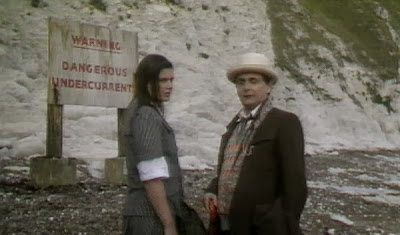At
the height of World War II, strange monsters emerge from the waters of Maiden’s
Point.
After their arrival, the Doctor (Sylvester McCoy)
informs his teenage companion, Ace (Sophie Aldred) that a nearby church is
built on old Viking graves, and that some form of “evil” was once buried there.
When
a blind scientist translates the rune-stones carved by those Vikings, however,
the Ancient Evil awakens. The Doctor -- who dealt with that evil, called
Fenric, some seventeen centuries earlier -- must now stop it again.
But Fenric is stronger than ever before and has
summoned a blood-eating monster from Earth’s distant future, the Haemovore, to
aid him.
Now, the Haemovore begins turning
humans into vampires, and threatens the very course of human history…
The
Sylvester McCoy era of Doctor Who started with absolute ignominy. His first story “Time and the Rani” is one of
the worst and most embarrassing titles you’ll find in the entire Doctor
Who catalog. After that debacle, the series then moved around aimlessly
for a time, before finally settling upon a new idea for his tenure.
And
that new idea was a really great, really inventive one, because it intimated that the Doctor was
not just some renegade Time Lord, but something else…something mysterious.
He was a cosmic chess-player -- God Himself? -- battling for ownership of the universe.
This new, Seventh Doctor was a master manipulator too, heading knowingly into danger,
and knowingly into situations that would help his companion, Ace (Sophie
Aldred) grow as a human being.
McCoy was downright masterful at appearing jovial and
avuncular, but then, suddenly, showcasing this dark, cunning side. So all of the sudden -- and to quote a warning sign in "The Curse of Fenric" -- there were suddenly "dangerous undercurrents" again in Doctor Who.
While it is true that the
production values, writing, and direction on the series were worse than ever during McCoy's reign, this new “lens” at the very least permitted audiences to parse the Doctor and his
journeys in a new and inventive fashion.
Sometimes,
the new template didn’t work at all. I will live happily the rest of my days if
I never have to sit through “Ghost Light” again.
But
sometimes, the template worked absolutely brilliantly, as is surely the case in “Curse
of Fenric.” I consider many serials of
the McCoy Era absolutely unwatchable, but this serial --warts and all -- qualifies as a
series masterpiece and high point of the Seventh Doctor's span.
We
learn in “The Curse of Fenric” that ages ago the Doctor played against Evil
Itself in a game of chess.
The Doctor
won and sent Evil back to the shadow realms. But after generations, Evil has
returned to take over the world. What we
get then in “Curse of Fenric” is a Manichean battle between the Doctor and his
opposite, a battle between a force of light and the force of darkness. I love the imagery that this game of chess evokes. The notion of the Doctor on a
desert plain, carving chess pieces out of bone is both mysterious and magical, and so the
question is raised: Doctor Who?
Is he a
messiah? Mankind’s savior? An elemental force of good, as I noted above?
A story like “The Curse of Fenric” succeeds
because it gives us a new perspective on the entire series. The Doctor’s “aimless” wandering is suddenly
not so aimless at all. Each time he lands the TARDIS, he is landing on a different chess board square, tipping over one of Evil's "players" or "pawns" if he is successful.
“Curse
of Fenric” bristles with powerful ideas, and one of the most powerful involves a
secular definition of faith.
The Doctor
reports that the Haemovores can be stopped by the power of complete faith. Faith is not defined, however, as a belief in God,
but rather boldly and unconventionally, as a total belief in anything an individual finds meaningful on a personal basis. One Russian soldier repels the vampires with
his unswerving belief in Marxism, for example.
Touchingly, Ace uses her love
for and faith in the Doctor to hold back the Haemovores.
I love "Curse of Fenric's" notion, that “faith” can apply to
something beyond the symbols of Christianity or organized religion. Unwavering human belief -- in family, in friends,
even in ideology -- is a powerful weapon, this serial suggests.
“The
Curse of Fenric” is also wonderful in terms of Ace’s development as a
character. The Doctor has led her to
this junction in time and space for a specific reason, and that reason is stunning. The episode’s moment of catharsis -- when Ace
dives into the waters of Maiden’s Point to cleanse herself of hatred (and
self-hatred) -- is absolutely remarkable. The moment is as touching as any in Doctor Who history.
Honestly,
I can’t say very positive things about almost any Sylvester McCoy Era serials besides this one, but “The
Curse of Fenric” gets to me each time I watch it. If, somehow, the rest of the Seventh Doctor’s
Era had been this good, perhaps Doctor Who would not have been canceled in
1989.
This
is the last serial of the original Doctor Who series (1963 –
1989) that I will review for Doctor Who Week. I turn tomorrow to the Paul
McGann movie of 1996, and the Christopher Eccleston era of the mid-2000s.








Easily McCoy's finest go as the Doctor.
ReplyDeleteFenric is a great story ... but I'm actually quite partial to Delta and the Bannermen, believe it or not. I love the contrast between the stereotyped "rock 'n' roll '50s" that the alien tourists are clearly expecting ... and the actual, tacky vacation retreat in Wales where they end up staying.
ReplyDelete